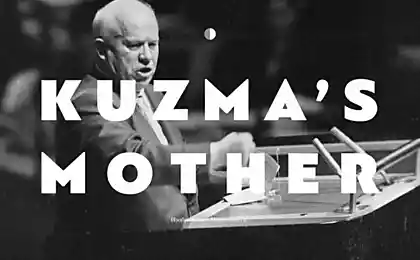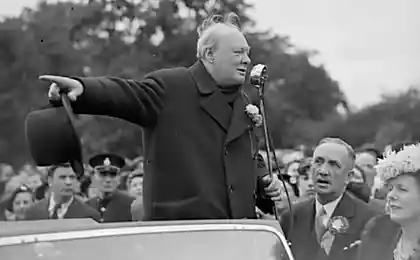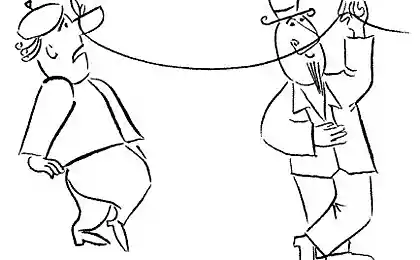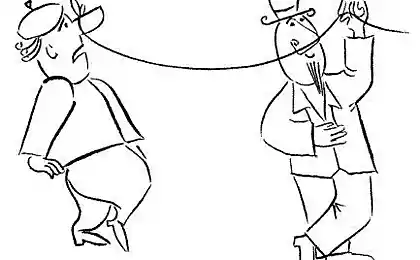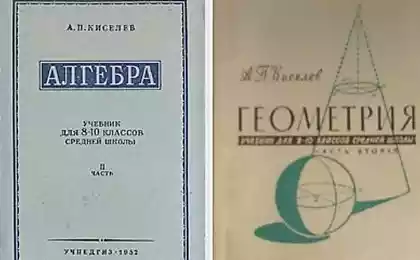809
25 of these values of well-known expressions
In Russian, famous for imagery, full of idioms, is used by all. We understand the modern meaning of such phrases as "the" buffoon "or" places not so remote, "but where they came from and that mean in reality? < Website publish amazing collection of stories and facts about the popular Russian idioms.
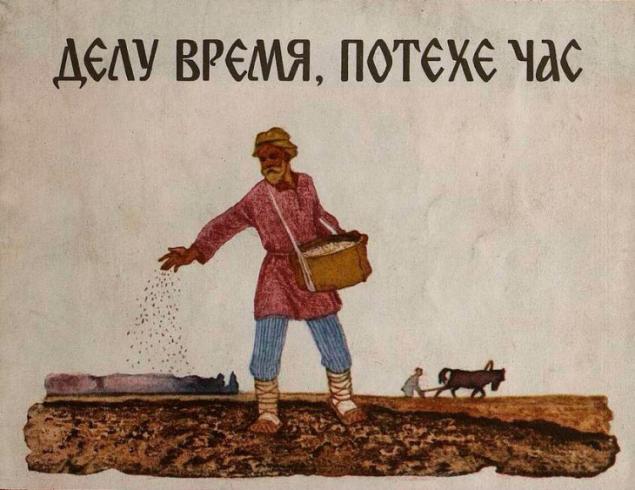
1. Where did the expression "a stitch»? H3> When a person is very poor, it can be said about: «a stitch»
2. What is the wish of good ways to become synonymous with the phrase "Get out»? H3> initially in Russia, especially in off-road conditions, the expression «Good riddance!» was the wish of a good way, clean and smooth. Later, the meaning has changed significantly phraseologism: say so - means to give the other party to understand that here no one holds.
3. Where did the expression "buffoon»? H3> More since Roman times belonging Pagliacci was a rattle of bovine bladder, which poured peas. In the medieval theater clowns beat a rattle of other actors, and even the audience. When the tradition reached Russia, our clowns began to adorn themselves with further pea straw, hence in language and expression stuck «clown»
4. That meant Alexis when he wrote: 'Cause time fun hour »? H3> The expression « Cause time fun hour » was first used in the compilation of the rules of falconry, published at the direction of Alexei Mikhailovich. The king personally made this postscript to the preface, keeping in mind that you need to spend time and work, and fun - leisure. This word "hour" is used here not in the sense of 60 minutes, and as a synonym of the concept of "time" in order to avoid repetition.
5. Where did the expression "as plywood over Paris»? H3> The expression «as plywood over Paris» is found in the literature since the mid-1970s. Most likely, it is bound to its appearance in 1975 film "Balloonist" - a biographical drama about wrestlers and circus artists Ivan Zaikin, who decided to give up everything and become a pilot. He went to study in Paris, and in one scene, he manages to climb into the sky on an airplane plywood. The film ends with the crash of the aircraft, and other failures of the protagonist.
6. Where did the term "sucking in the stomach»? H3> Before cavity under the ribs on the sternum xiphoid process called "spoon." In itself, this word has been preserved in the language, but is used in expressions «sucks in his stomach» and «aches in the stomach» , when we talk about an unpleasant feeling when hunger or excitement .
7. Where did the phrase "pull the gimp»? H3> Gold or silver thread, which in the old embroidered decoration on clothing, called gold thread. To get it, it was necessary to pull ticks long metal wire. Hence the expression «pull the gimp» and «dawdle» in the sense to perform a boring monotonous work or delay the performance of any business.
8. Where did the term "alive smoking room»? H3> In the old days in Russia, among other things, children playing in the "smoking room". Circling passed burning splinter, and the one who hands it goes off, are lost. During the game, it was necessary to sing: "Alive, alive and sympathy Boxing, alive, alive, not dead." From here there was an expression «alive smoking room» , which may use against a person in good health and continued to do their work, although about him thought that he already had disappeared or died.
9. Where did the expression "places not so distant»? H3> In the pre-revolutionary Russian law there were two categories of reference "in the remote places of Siberia" and "in the not so distant places of Siberia." The second sentence of the official term turned into allegorical turn. Now, speaking of the prison, we often use the expression «places not so distant»
10. What is the original meaning of the expression "exception proves the rule?» H3> The expression «The exception proves the rule» in most cases is used in a completely different from the original sense. The phrase is of Latin origin: «Exceptio probat regulam in casibus non exceptis», the first time it has used the Roman orator Cicero. The translation is an important part of the second sentence: the exception proves the existence of a general rule, where these exemptions are not stipulated. For example, a road sign "Parking prohibited on Sundays" refers to the rule allowing parking on the other days.
11. Why Indians at one time heavily diluted with cobras, and then abruptly stopped? H3> Once the British during the colonial occupation in India, decided to reduce the number of bred cobras, which announced a reward for their heads. Local people rushed to destroy the snakes, thus reducing their number, but then, on the contrary, moved to their breeding for easy earnings. After the abolition of the remaining awards cobras Indians let go free, help to ensure that the population of snakes only increased compared with baseline.
12. Where did the expression "topsy-turvy»? H3> In the time of Ivan the Terrible in Russia, one of the signs of the dignity of the nobles was embroidered collar, which was called "collar." If any exposed lord the king's anger and disgrace, his usual seated on a skinny nag backwards, after removing the clothes inside out. Since then stuck expression «topsy-turvy» to mean "on the contrary, the wrong».
13. Why about the lucky man say that he was born under a lucky star? H3> When a person is lucky, they say that he was born under a lucky star. The word "shirt" in this expression appeared not so long ago, but before it is pronounced as «born in the shirt» , and it had a purely practical sense. The fact that the called shirt not only clothes but also amniotic bubble, which is the child during pregnancy. Sometimes during birth this bubble is not broken, and the child appears in it to light that, superstitious representations, promises him a lifetime of happiness and luck.
14. Where did the expression "last Chinese warning»? H3> The 1950-1960 American planes often violated the airspace of China for exploration. Chinese authorities recorded each violation and each time sent out through diplomatic channels, "warning" the United States, but no real action for them should not have, and the expense of such warnings was conducted hundreds. This policy has led to the emergence of expression «Last warning» , meaning threats without consequences.
15. Why newspapers with sensational news is called yellow press? H3> The term "yellow press" originated in the United States in the late 19th century. By this time, it has become very popular two newspapers - New York World and New York Journal, which did not bet on the usual news coverage, and the giving readers the emotional sensations and material supply. In 1895 New York World began publishing comic Richard Autkalta full of satire and scathing comments about the policy, whose main character was a boy in the yellow shirt. A year Autkalta lured to New York Journal, and now both newspapers began publishing comics related.
16. Where did the greeting "High five!»? H3> The word "pastern" used to be called a brush or hand. There was also a welcome expression "Give pastern!", Which was later reduced to one letter and transformed into «Give me five!» . Condensed phrase allegedly received special popularity because of similar idioms of the English language «High five!» And «Give me five!».
17. Why photographers say, "say cheese!»? H3> Before photographers to all children in the group photo looked into the camera and said: "Look here! say cheese! ». This bird was quite real at the beginning of the era of mass pictures - though not alive, and brass.
18. Where did the expression "hang all the dogs»? H3> When a person is accused of anything else, you can hear the expression: «hang on him all the dogs»
19. Where did the phrase "not in that steppe»? H3> The operetta "Wedding in Malinovka" one of the heroes playfully distorted the name of the dance two-step, calling it "in the steppe." Hence, the people spread the expression «not in that steppe» to mean "go in the wrong direction" or "speak out of place».
20. Where did the expression "crimson bells»? H3> The expression «crimson bells» , which indicate the melodious singing of bells, has no relation to the bird robin or a raspberry, and takes its name from the Belgian city Mechelen (Malines in French or transcription). This city is considered to be the European center of the bell casting and music. Mehelenskomu standard consistent with Russia's first carillon (a musical instrument to play the melody on several bells), ordered by Peter I in Flanders.
21. Why does the expression "to return to the native land" should be pronounced differently? H3> The popular expression "to return to the native land", meaning a return to his home, to home, to properly pronounce differently: «to return to their hearth »
22. What is an idiom in many European languages, of the Russian phrase "white crow»? H3> The analogue Russian expression «black sheep» in many European languages is an idiom «black sheep» «black sheep»
23. Where did the expression "on the sly»? H3> sape word in French means "hoe". In the 16-19 centuries the term "sapa" refers to the way we digging a trench, ditch or tunnel to approach the fortifications. The saps the walls of the locks are sometimes placed bombs of gunpowder, and specialists trained to do it, were called sappers. But by digging covert undermining expression was «sly» , which today is used to connote a careful and discreet action.
24. What is the expression of the futility of actually literally performed medieval monks? H3> The expression «tread water» , which indicates the occupation of useless matter, has very ancient origins - it was used more ancient authors such as Lucian. In medieval monasteries it was a literal character: the guilty monks were forced to water it as a punishment.
25. Where did the expression "business burned»? H3> Previously, if a lawsuit disappeared, the man could not show a legitimate charge. Cases are often burned, either by the fire in the wooden buildings of the courts, or by arson for a bribe. In such cases, the accused said: «The thing burned»






